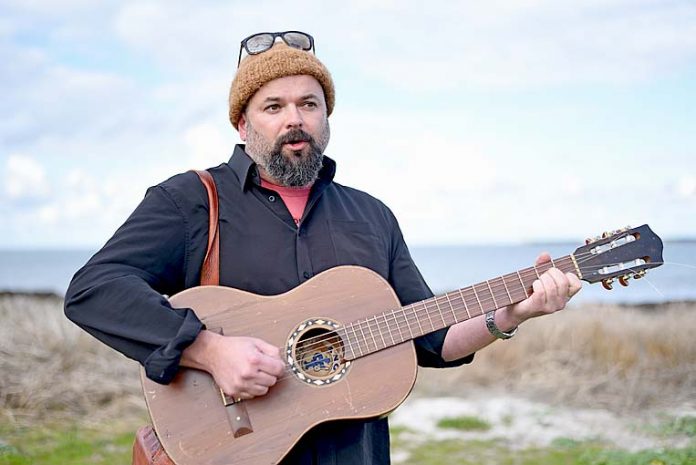
COMPOSING traditional sea shanties inspired by the Shipwreck Coast, Adam Hardcastle immersed himself in the life of a 19th century Portland resident last month.
Eating a Victorian-era diet and writing his “blog” by hand using calligraphy ink, Mr Hardcastle stepped back in time to tell stories from the point of view of locals living in the seaside town in the late 1800s.
“I lived in Portland for a month during June as an Artist in Residence, researching the history of the surrounding coastal region with the intention of writing sea shanties – the songs sailors used to keep a rhythm when lifting a sail and for particular jobs,” Mr Hardcastle told The Border Watch.
“I have an interest in work songs and I’ve spent a bit of time researching women’s wool kneading songs in Scotland – quite often they write these songs because they need to entertain themselves and the tempo was exactly what they needed.
“I ended up writing a number of ballads or ditties and some sea shanties.”
Born in Adelaide, Mr Hardcastle has lived for 20 years in “blink and you’ll miss it” Wye, between Mount Gambier and Nelson.
“Wye is the middle of nowhere, but it’s lovely,” he said.
“When my partner and I moved to the region we liked Portland and Mount Gambier and I was thrown into a primary school classroom for the first time ever.
“I was terrified but I just loved it and that’s what I’ve been doing for 15 years now.”
A graduate of the prestigious Elder Conservatorium of Music in Adelaide where he studied opera singing and composition, Mr Hardcastle said he had “always loved writing music.”
“During the project people kept asking me if I were going to write any shipwreck songs or write about any heroic moments and I kept saying, ‘no I don’t want to do that’ and I wasn’t quite sure why,” he said.
“What I wanted the songs to be was the type of music people would have written in a pub in Portland in 1890 for the community’s benefit and for fun.
“Writing a shipwreck song in retrospect makes sense but in 1890 you wouldn’t sing about a devastating event that only just happened – it would be like us singing about a plane crash, we just wouldn’t do it.”
He said what he wanted to create became clearer during the process.

“The songs all have an emotional point or a funny point and many of the songs turned out a bit cheeky,” Mr Hardcastle said.
“A good example is a song I wrote about bath houses in Portland, cleanliness was a big thing and they built a bath house here in 1850 and it blew down so they built another in 1880 – I find that infrastructure fascinating but wasn’t sure how to turn that into a song that wasn’t boring.
“I came at it from the angle of someone who thought Victorian hygiene was unnecessary – from the point of view of someone who thinks the bath houses are a bit silly.”
In contrast, a softer ballad explored the emotions felt by a settler arriving in Australia from across the sea.
“Some of the songs are really mellow and sweet and emotional, ‘The Night we sighted the Otway’ is about arriving in Australia for the first time,” Mr Hardcastle said.
“The lyrics in that song are still as relevant today for migrants traveling to Australia experiencing that uncertainty but full of hope for a better life.”
During his residency Mr Hardcastle lived as ‘authentically Victorian’ as he could – he carried a leather satchel with handwritten music, played his antique guitar and read first edition books from the 1850s.
“I purchased Scottish and Irish first editions from the 1850s to read, I researched what they ate back then and tried to eat the same way – it was really interesting looking at the Victorian diet because it wasn’t that different to ours today,” he said.
“I played the type of classical and folk music they would have heard during that era and all the songs I wrote were in calligraphy, which just slows you down – it takes ages and it’s lovely and really mesmerising.
“I tried to step back in time a little bit – the slowing down aspect was the most helpful thing, it allows things to bubble to the surface.”
While Mr Hardcastle will perform his original sea shanties and ballads at Portland’s 2017 Upwelling Festival, he offered a taste of the 19th century at Mac’s Hotel every Wednesday during his residency.
“I went to the Mac’s Hotel every week to jam with the Irish band who play there on a Wednesday night – I was trying to write that engaging, cheeky pub music,” he said.
“The band very generously allowed me to play a few of my originals.
“When you’re playing the songs to a bunch of musicians and they giggle you know you’re on the right track – it was good to have that human feedback.”
Adjusting to life back in the 21st century, Mr Hardcastle said he would continue to immerse himself in music back in the classroom at Portland North Primary School.
“I love teaching music,” Mr Hardcastle said.
“Teaching primary students is very rewarding – you get to watch their experience over six years and see them grow musically and it’s beautiful.”








